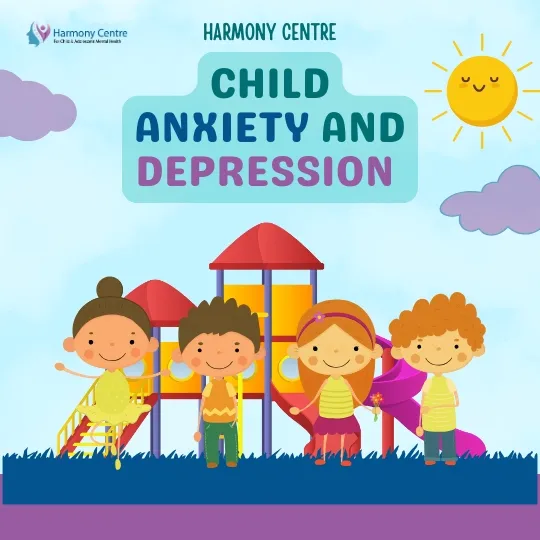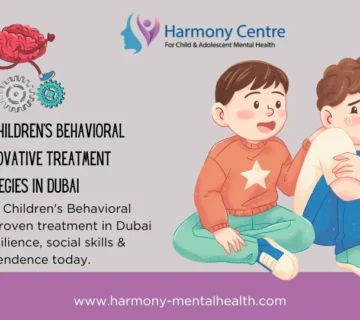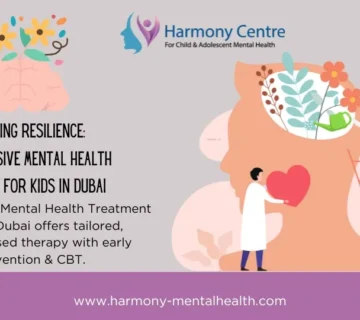Child Anxiety and Depression: Family-Centered Strategies for Effective Management in Dubai

Discover family-centered strategies to manage child anxiety and depression in Dubai. Learn expert approaches and book a free consultation now in the UAE!
In today’s fast‑paced world, children face a myriad of challenges that can trigger anxiety and depression. In vibrant, multicultural cities like Dubai, the pressures of academic demands, social expectations, and digital distractions can significantly impact a child’s emotional well‑being. At Harmony Centre, we understand that addressing child anxiety and depression requires more than individual therapy—it demands a comprehensive, family‑centered approach. Our integrated programs empower parents, strengthen family bonds, and provide targeted, evidence‑based interventions that support the mental health of your child and your entire family.
Book a Free Consultation in Dubai Now and take the first step toward effective, holistic management of child anxiety and depression.
Contact Information
| Contact Method | Details |
|---|---|
| Phone | +971 (52) 8773268 / 04 558 2015 |
| Click Here | |
| info@harmony-mentalhealth.com | |
| Address | Office 409, Building Alrazi-64C, 26th St, Healthcare City, Dubai |
1. Introduction: The Importance of Family-Centered Care in Managing Anxiety and Depression
Childhood anxiety and depression have become increasingly common in today’s high‑pressure environments. These conditions can interfere with a child’s academic performance, social interactions, and overall development. In Dubai, where the pace of life is intense and expectations are high, a nurturing family environment is essential to help children build resilience and navigate challenges effectively.
At Harmony Centre, we believe that family‑centered care is the cornerstone of effective mental health management. When parents are equipped with practical strategies and a deep understanding of mental health, they can create a supportive atmosphere that not only alleviates symptoms but also fosters long‑term emotional well‑being. Our multidisciplinary team works closely with families to develop personalized treatment plans that integrate therapeutic interventions with everyday parenting techniques, ensuring that support extends beyond the clinic and into every aspect of your child’s life.
Research from reputable sources like the Dubai Health Authority highlights that early intervention and active family involvement can reduce symptoms of anxiety and depression by up to 40–60%. This evidence underpins our commitment to a holistic, family‑centered approach that empowers you to become an active partner in your child’s mental health journey.
2. Understanding Child Anxiety and Depression
Before implementing effective strategies, it’s essential to understand the nature of anxiety and depression in children. These conditions can manifest in various ways, impacting behavior, academic performance, and social relationships.
What is Child Anxiety?
Child anxiety is characterized by excessive worry, fear, and apprehension that interferes with daily activities. Symptoms may include:
- Physical Signs:
Headaches, stomachaches, rapid heartbeat, and fatigue. - Behavioral Signs:
Avoidance of social situations, reluctance to try new things, and irritability. - Emotional Signs:
Excessive fear, nervousness, and difficulty concentrating.
What is Child Depression?
Child depression is more than just sadness. It’s a clinical condition that can affect a child’s mood, behavior, and overall functioning. Symptoms include:
- Persistent Sadness:
A noticeable, ongoing low mood that doesn’t seem to improve. - Loss of Interest:
Disinterest in activities that once brought joy. - Changes in Appetite or Sleep:
Significant weight loss or gain, insomnia, or excessive sleeping. - Social Withdrawal:
Avoidance of friends and family, and a tendency to isolate. - Feelings of Worthlessness:
Low self-esteem, self-criticism, or a sense of hopelessness.
Both anxiety and depression can co-occur, and their symptoms often overlap. Early recognition and intervention are critical to preventing these conditions from hindering a child’s development.
3. Family-Centered Strategies for Managing Anxiety and Depression
Managing child anxiety and depression effectively requires a comprehensive approach that involves the entire family. Here are several evidence‑based strategies that parents can adopt to create a supportive, nurturing environment.
A. Establish a Consistent Routine
- Why It Works:
A predictable daily routine reduces uncertainty and helps children feel secure. - Practical Tips:
- Create a daily schedule that includes designated times for schoolwork, play, meals, and relaxation.
- Use visual aids such as charts or calendars to help your child understand the day’s structure.
- Maintain consistent sleep patterns by establishing a calming bedtime routine.
B. Foster Open and Honest Communication
- Why It Works:
Open communication allows children to express their feelings, reducing the buildup of negative emotions. - Practical Tips:
- Set aside regular time for family discussions where every member can share their thoughts and feelings.
- Encourage your child to describe their day and discuss any worries they may have.
- Practice active listening by giving your full attention, validating their feelings, and offering empathetic responses.
C. Implement Positive Reinforcement
- Why It Works:
Positive reinforcement encourages desirable behaviors and builds self-esteem. - Practical Tips:
- Praise your child for small achievements and efforts, reinforcing positive behavior.
- Use a reward system to celebrate successes and motivate your child to maintain healthy behaviors.
- Ensure that feedback is specific and focuses on the effort rather than just the outcome.
D. Encourage Physical Activity and Outdoor Play
- Why It Works:
Physical activity reduces stress, improves mood, and boosts overall mental health. - Practical Tips:
- Encourage regular outdoor play, sports, or family walks.
- Limit screen time to ensure your child has ample opportunities for physical movement.
- Participate in physical activities together as a family to strengthen bonds and promote a healthy lifestyle.
E. Practice Mindfulness and Relaxation Techniques
- Why It Works:
Mindfulness helps children manage stress and regulate their emotions. - Practical Tips:
- Introduce simple mindfulness exercises, such as deep breathing or guided meditation, tailored to your child’s age.
- Create a calm space at home where your child can relax and practice mindfulness.
- Use mindfulness apps or online resources designed for children to make practice fun and engaging.
F. Build a Collaborative Relationship with Educators
- Why It Works:
A strong partnership between parents and teachers ensures that support for your child is consistent across home and school. - Practical Tips:
- Maintain regular communication with your child’s teachers about their progress and any concerns.
- Work together to develop an individualized education plan (IEP) that addresses your child’s unique needs.
- Participate in school meetings and workshops to stay informed about strategies that support your child’s mental health.
By integrating these strategies into your daily life, you can create a home environment that not only alleviates anxiety and depression but also promotes overall emotional resilience and academic success.
4. Impactful Client Outcomes
Our approach to managing child anxiety and depression through family-centered care has led to significant, measurable improvements for many families. Here are some examples of the positive outcomes we’ve seen:
- Enhanced Emotional Regulation:
Many families report that children who participate in our programs exhibit improved emotional control, with a noticeable reduction in outbursts and mood swings. Quantitative data from our follow‑up assessments indicate that emotional regulation can improve by 40–50% within six months. - Improved Academic Engagement:
Parents have observed that children become more focused and engaged in school following consistent implementation of the strategies learned through our sessions. Teachers often note enhanced concentration and a more positive classroom demeanor. - Stronger Family Bonds:
Families participating in our programs consistently report better communication and reduced conflict at home. Our structured family sessions have helped parents and children build a foundation of trust and understanding, leading to a more harmonious family dynamic. - Increased Self-Esteem and Social Confidence:
Children gain confidence as they learn to express their feelings and manage stress effectively. This increased self-esteem is reflected in their improved social interactions and willingness to participate in group activities.
These impactful client outcomes, supported by both qualitative feedback and quantitative data, demonstrate the transformative effect of our family‑centered approach in managing child anxiety and depression.
5. How to Get Started: Your Journey to a Healthier Future
Taking the first step toward managing your child’s anxiety and depression is simple and accessible with Harmony Centre. Our process is designed to be clear, supportive, and tailored to your family’s unique needs.
Step-by-Step Process
- Book a Free Consultation:
- Action: Contact us via our UAE‑based phone number or WhatsApp to schedule an initial, no‑obligation consultation.
- Purpose: Discuss your family’s concerns and learn about our integrated approach to mental health care.
- CTA: Book a Free Consultation in Dubai Now
- Comprehensive Assessment:
- Action: Participate in a detailed assessment conducted by our multidisciplinary team, including interviews, questionnaires, and behavioral observations.
- Purpose: Identify the underlying factors contributing to your child’s anxiety and depression, and gather insights from parents, teachers, and clinicians.
- Personalized Treatment Plan:
- Action: Collaborate with our experts to develop a customized treatment plan that integrates evidence‑based therapies and practical strategies for home and school.
- Purpose: Establish clear, measurable goals to guide the therapy process and track progress over time.
- Regular Therapy and Support Sessions:
- Action: Engage in structured therapy sessions, which may include individual counseling for your child, family therapy sessions, and parental guidance workshops.
- Purpose: Implement the strategies and monitor progress through continuous follow‑up and adjustments to the treatment plan.
- Ongoing Monitoring and Integration:
- Action: Participate in periodic evaluations and progress reviews to ensure that the therapeutic strategies remain effective.
- Purpose: Reinforce positive changes and adapt the approach as your child’s needs evolve.
Our streamlined process is designed to provide you with comprehensive, integrated care that addresses your child’s mental health holistically—ensuring lasting improvements and a supportive environment for growth.
FAQs & Final Thoughts About Child Anxiety and Depression Support in Dubai
Final Thoughts about Child Anxiety and Depression Dubai
Managing child anxiety and depression through a family‑centered approach offers a powerful path to lasting emotional well‑being. At Harmony Centre, we are dedicated to providing comprehensive, evidence‑based care that supports not only your child but your entire family. By integrating proven therapeutic strategies with practical, everyday techniques, we empower families to build resilience, improve communication, and create a nurturing environment where children can thrive.
If you’re ready to take the first step toward a healthier, happier future for your child, Book a Free Consultation in Dubai Now and let our expert team guide you on your journey to lasting mental wellness. For additional resources and further information on our services, please visit the Dubai Health Authority website.
Embrace a holistic, family‑centered approach today—because every child deserves a supportive foundation for lifelong success.
Book a Consultation Now: Call +971 4 558 2015 or visit www.harmony-mentalhealth.com.
Join our online community and stay updated with our latest events, articles about Child Anxiety and Depression Dubai


